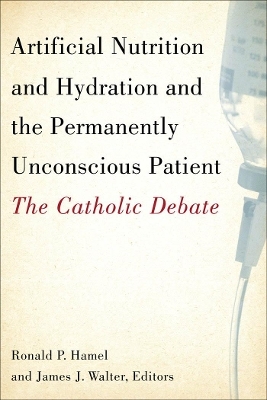
Artificial Nutrition and Hydration and the Permanently Unconscious Patient
Georgetown University Press (Verlag)
978-1-58901-178-6 (ISBN)
During the past few decades, high-profile cases like that of Terry Schiavo have fueled the public debate over forgoing or withdrawing artificial nutrition and hydration from patients in a persistent vegetative state (PVS). These cases, whether involving adults or young children, have forced many to begin thinking in a measured and careful way about the moral legitimacy of allowing patients to die. Can families forgo or withdraw artificial hydration and nutrition from their loved ones when no hope of recovery seems possible? Many Catholics know that Catholic moral theology has formulated a well-developed and well-reasoned position on this and other end-of-life issues, one that distinguishes between "ordinary" and "extraordinary" treatment. But recent events have caused uncertainty and confusion and even acrimony among the faithful. In his 2004 allocution, Pope John Paul II proposed that artificial nutrition and hydration is a form of basic care, thus suggesting that the provision of such care to patients neurologically incapable of feeding themselves should be considered a moral obligation.
The pope's address, which seemed to have offered a new development to decades of Catholic health care ethics, sparked a contentious debate among the faithful over how best to treat permanently unconscious patients within the tenets of Catholic morality. In this comprehensive and balanced volume, Ronald Hamel and James Walter present twenty-one essays and articles, contributed by physicians, clergy, theologians, and ethicists, to reflect the spectrum of perspectives on the issues that define the Catholic debate. Organized into six parts, each with its own introduction, the essays offer clinical information on PVS and feeding tubes; discussions on the Catholic moral tradition and how it might be changing; ecclesiastical and pastoral statements on forgoing or withdrawing nutrition and hydration; theological and ethical analyses on the issue; commentary on Pope John Paul II's 2004 allocution; and the theological commentary, court decisions, and public policy resulting from the Clarence Herbert and Claire Conroy legal cases.
A valuable resource for students and scholars, this teachable volume invites theological dialogue and ethical discussion on one of the most contested issues in the church today.
Ronald P. Hamel is senior director of ethics for the Catholic Health Association. He is the author of Making Health Care Decisions: A Catholic Guide. James J. Walter is the Austin & Ann O'Malley Professor of Bioethics and chair of the Bioethics Institute of Loyola Marymount University. He is coauthor of The New Genetic Medicine: Theological and Ethical Reflections and Contemporary Issues in Bioethics: A Catholic Perspective.
Introduction: The State of the Debate PART ONE: Medical Perspectives1. Position of the American Academy of Neurology on Certain Aspects of the Care and Management of the Persistent Vegetative State PatientAmerican Academy of Neurology 2. Feeding Tubes: Sorting Out the IssuesMyles N. Sheehan, SJ PART TWO: The Catholic Tradition and Historical Perspectives 3. Catholic Teaching on Prolonging Life: Setting the Record StraightMichael R. Panicola 4. A History of Ordinary and Extraordinary MeansDonald E. Henke 5. Must We Preserve Life?Ronald Hamel and Michael Panicola PART THREE: Ecclesiastical and Pastoral Perspectives 6. The Prolongation of LifePope Pius XII 7. Declaration on EuthanasiaSacred Congregation for the Doctrine of the Faith 8. The Artificial Prolongation of LifePontifical Academy of Sciences9. On Withdrawing Artificial Nutrition and HydrationTexas Bishops and the Texas Conference of Catholic Health Facilities 10. Nutrition and Hydration: Moral and Pastoral ReflectionsNational Conference of Catholic Bishops' Committee for Pro-Life Activities 11. Ethical and Religious Directives: Introduction to Part V and Directives 57-58United States Conference of Catholic Bishops PART FOUR: Ethical and Theological Perspectives12. The PVS Patient and the Forgoing/Withdrawing of Medical Nutrition and HydrationThomas A. Shannon and James J. Walter 13. Should Nutrition and Hydration Be Provided to Permanently Unconscious and Other Mentally Disabled Persons?Germain Grisez 14. End-of-Life Care RevisitedDaniel P. Sulmasy, OFM PART FIVE: John Paul II's Papal Allocution and Responses 15. Care for Patients in a "Permanent" Vegetative StatePope John Paul II 16. John Paul II on the "Vegetative State"Richard M. Doerflinger 17. Medically Assisted Nutrition and Hydration: A Contribution to the DialogueMark Repenshek and John Paul Slosar 18. Assisted Nutrition and Hydration and the Catholic TraditionThomas A. Shannon and James J. Walter 19. Reflections on the Papal Allocution Concerning Care for Persistent Vegetative State PatientsKevin O'Rourke, OP PART SIX: Legal and Public Policy Perspectives 20. The Clarence Herbert Case: Was Withdrawal of Treatment Justified?John R. Connery, SJ21. Caring or Starving? The Case of Claire ConroyRichard A. McCormick, SJ PermissionsList of ContributorsIndex
| Erscheint lt. Verlag | 13.9.2007 |
|---|---|
| Co-Autor | Ronald P. Hamel, James J. Walter, American Academy of Neurology |
| Verlagsort | Washington, DC |
| Sprache | englisch |
| Maße | 152 x 229 mm |
| Gewicht | 408 g |
| Themenwelt | Religion / Theologie ► Christentum ► Kirchengeschichte |
| Medizin / Pharmazie ► Medizinische Fachgebiete ► Medizinethik | |
| Studium ► Querschnittsbereiche ► Geschichte / Ethik der Medizin | |
| ISBN-10 | 1-58901-178-3 / 1589011783 |
| ISBN-13 | 978-1-58901-178-6 / 9781589011786 |
| Zustand | Neuware |
| Haben Sie eine Frage zum Produkt? |
aus dem Bereich


